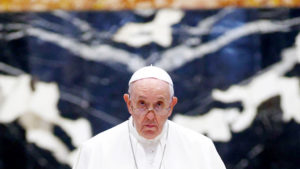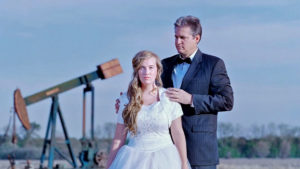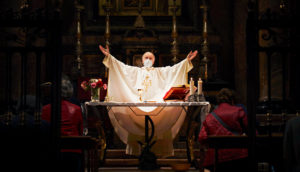For well over a year, a nasty rumour has been floating through the Vatican that Pope Francis is terminally ill with cancer. I was told it was true by an Italian prelate in an apartment just a stone’s throw from the hostel where the 85-year-old pontiff is now pushed around in a wheelchair. A diplomatic source discussed it ruefully over an espresso in the Borgo Pio. A well-connected American traditionalist Catholic texted that it was “definitely true!” — the exclamation mark suggesting that he wasn’t too distressed.
Then, on Sunday morning, the Associated Press reported that “Italian and Catholic media have been rife with unsourced speculation that Francis might be planning to follow in Benedict’s footsteps” by resigning, “given his increased mobility problems”.
The reason for the speculation? The Pope has announced that in August he’s visiting the Italian city of Aquila, where he will pray at the tomb of Pope Celestine V, a hermit who resigned the papacy in 1294 after only five months. Benedict XVI also prayed at the tomb in 2009 — and in 2013 he became the first pope since Celestine to resign.
Moreover, Francis will travel to Aquila in the middle of a consistory at which he will create 16 cardinals who can vote in the next conclave, thus ensuring that 60% of the electors have been picked by him. This is called “stacking the deck” so that the next successor of St Peter is in your own image. Most popes do it, but very few with the partisan determination of Francis since he took office nine years ago. Also, he’s holding the consistory three months ahead of schedule.
The cancer story and the Aquila one aren’t mutually exclusive. If Francis is as ill as the rumour-mongers suggest — and I’ve heard gruesomely detailed descriptions of spreading tumours — then the August consistory and visit to Celestine’s tomb mean he can stage a dramatic exit immediately after his last opportunity to pack the college of cardinals.
The one thing the two rumours have in common is that no one has produced a shred of evidence to back them up. On Tuesday the Washington Post quoted a senior Vatican official “speaking on the condition of anonymity to discuss a sensitive issue” — i.e. Francis’s health. He said: “His situation isn’t brilliant, but it’s not enough to impose a resignation.”
However, in the same article Massimo Faggioli, a professor of theology at Villanova University, Philadelphia, said that: “What is clear is that his pontificate has entered his declining final stage… He is aware that he is approaching the end of his pontificate.”
That’s interesting, because Faggioli is an uber-loyalist. He’s one of the founding members of “Team Francis”, a group of journalists and other commentators whose near-deification of this pope wouldn’t be out of place in North Korea. Faggioli has made a career out of his laudatory analysis of Francis; many Catholics on Twitter tease him for it, at which point (and I speak from experience) he immediately blocks them.
“Declining final stage”? Francis doesn’t look like he’s dying: he’s just a fat man in a wheelchair. There’s nothing wrong with his faculties. He continues to charm visitors and, when it comes to internal church politics, he’s more vindictive than ever. (Giving a red hat to Bishop Robert McElroy of San Diego, a hardline liberal who favours giving Communion to pro-abortion politicians, was a masterstroke of revenge against Francis’s least favourite people in the world: American conservative bishops.)
Perhaps “declining final stage” is just the sound of a worried Faggioli jumping ship while he still has time. As a Vatican diplomat puts it: “Common sense tells us that Pope Francis is nearer the end than the beginning of his time in office. Those people who talk about him as if he’s this great reformer who’s going to live for ever just look ridiculous. The new pope, whether he’s liberal or conservative, won’t be interested in their flattery.”
Team Francis aren’t popular in Rome these days. The best kept secret of this pontificate, at least so far as the general public in concerned, is that Jorge Bergoglio is not, and never has been, a nice man. He made so many enemies in Argentina that he hasn’t dared set foot in his native country since being elected pope. He was involved in some jaw-dropping scandals there, most shockingly his attempt to protect his child abuser ally Fr Julio Grassi from justice. He’s lucky that the Vatican press corps is too afraid of him to investigate them properly.
Francis has a streak of cruelty in him, and recently he’s done little to hide it. Last year his authoritarian attempt to crush regular celebrations of the traditional Latin Mass offended hundreds of bishops who don’t like that style of worship but dislike the Argentinian pontiff even more. They have quietly ignored the ruling, much to the fury of the papal liturgy chief, a painfully self-important Yorkshireman called Arthur Roche who will be made a cardinal in August.
But liturgical matters won’t loom large at the next conclave, whenever it is. Sexual morality will. Francis has spent nearly a decade casting doubt on the wisdom of Catholic teaching on divorce and homosexuality — but without making any formal changes to the rules. Never before will a conclave have been forced to debate such fundamental questions. And, up to a point, it will be operating in the dark. Francis has a policy of not summoning the cardinals to meet as a single body, which means many of them haven’t even met each other and don’t know who thinks what.
It’s likely, however, that the most contentious topic will be homosexuality, and this is where the labels “liberal” and “conservative” are misleading. Left-wing cardinals from the developing world, of whom Francis has created plenty, may countenance a more relaxed attitude towards divorced-and-remarried Catholics, but the thought of homosexuality turns their stomachs.
That may push them towards a moderate conservative such as Cardinal Péter Erdő of Hungary, a charming and self-effacing scholar who, when called upon to preside over a synod of bishops at the Vatican in 2014, suddenly looked and sounded like a pope. It certainly rules out Cardinal Jean-Claude Hollerich of Luxembourg, president of the European Conference of Bishops and a Jesuit thinker of far greater distinction than Pope Francis, who wants the Church to recognise gay relationships.
At the moment, however, all eyes are on Cardinal Matteo Zuppi, the rake-thin bicycling Archbishop of Bologna, 66, who is gay-friendly while unobtrusively sticking to the line that homosexual acts are sinful. That could be enough to satisfy the African cardinals. Zuppi’s political credentials are likely to help him: he’s associated with the centre-Left Sant’Egidio movement, which is obsessed with pulling strings — no bad thing during a conclave. He’s also nice to traditionalists: as a bishop he asked them to teach him how to celebrate the old Mass, and he hasn’t clamped down on it in his diocese.
But the smart money, as in most conclaves, will be on “none of the above”. Except on rare occasions, the number of ballots means the white smoke is followed by a murmur of surprise. But I’ll make one prediction. Bishops all over the world are sick of being bullied by the Vatican. The new pope won’t be a Francis II either in name or in his approach to governing the Church. When this pope goes, that mould will be broken, and there probably isn’t a single cardinal who wants to piece it together again.
Disclaimer
Some of the posts we share are controversial and we do not necessarily agree with them in the whole extend. Sometimes we agree with the content or part of it but we do not agree with the narration or language. Nevertheless we find them somehow interesting, valuable and/or informative or we share them, because we strongly believe in freedom of speech, free press and journalism. We strongly encourage you to have a critical approach to all the content, do your own research and analysis to build your own opinion.
We would be glad to have your feedback.
Source: UnHerd Read the original article here: https://unherd.com





